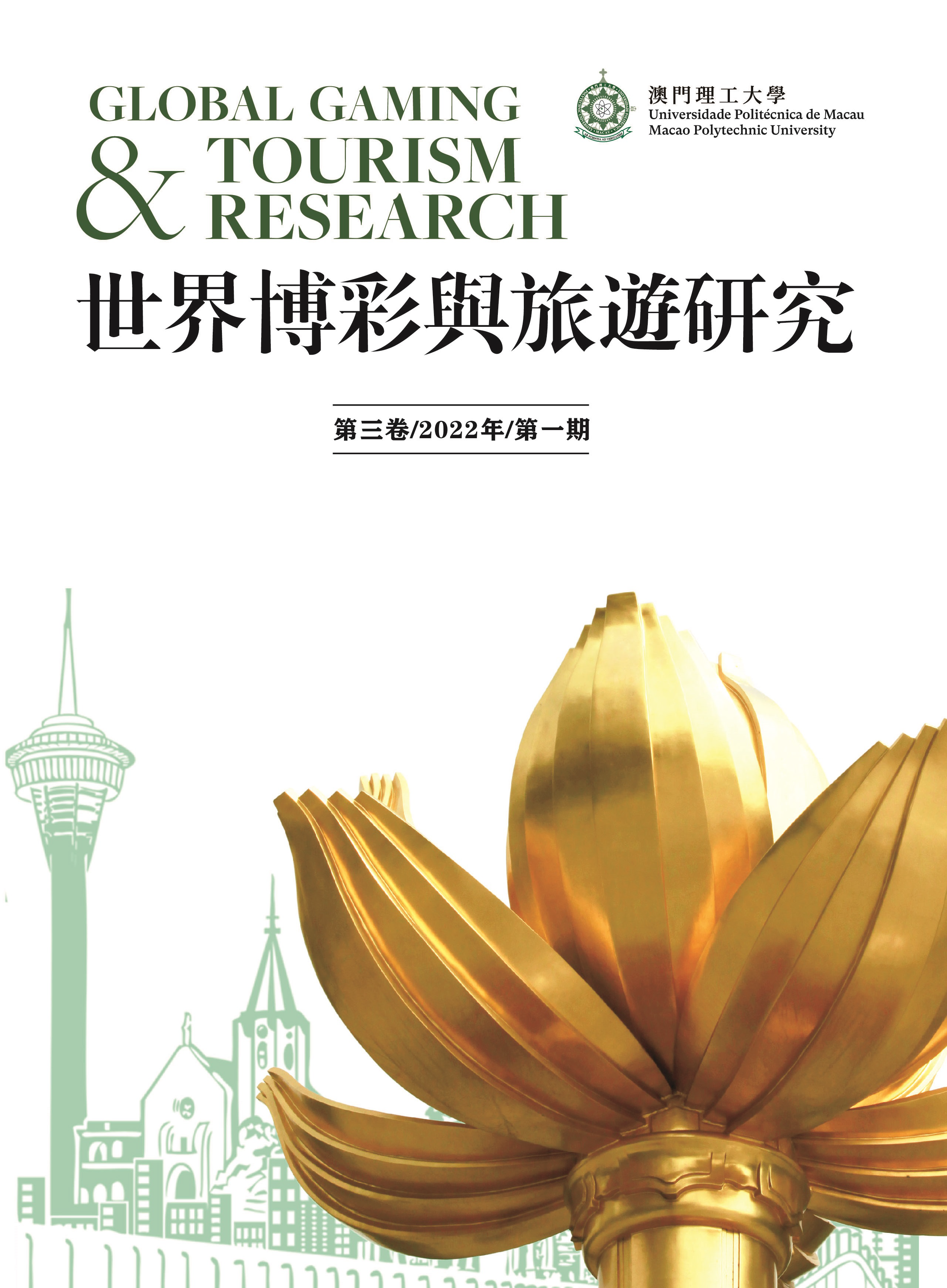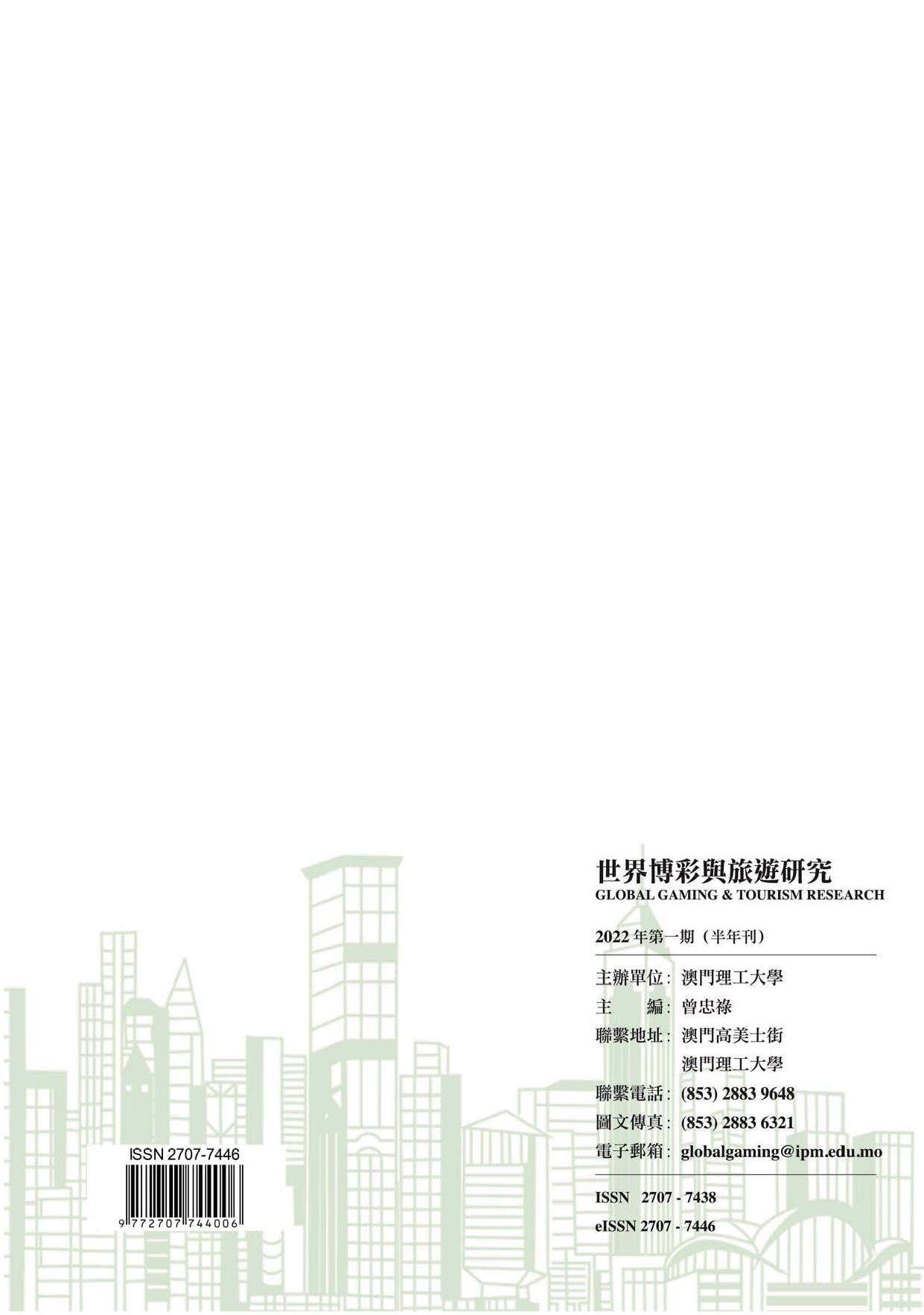Estudos na Área do Jogo e do Turismo Mundial


|
ISSN: |
ISSN 2707-7438 eISSN 2707-7446 |
|---|---|
|
Period: |
Semi-annually |
|
Introduction: |
“Global Gaming & Tourism Research” aims to promote the sustainable development of the gaming and tourism industry. In addition to providing support for science-based decision-making across the public and gaming sectors, this academic journal seeks to serve as an exchange platform for gaming and tourism research work. “Global Gaming & Tourism Research” covers such key areas as the development trend of the Macao and global gaming industries, evolution and trend of consumer preference among gaming tourists, responsible gaming theory and practice, tourist behaviour theory and case studies, and tourist destination management theory and practice, etc. Contributions by experts, scholars and industry practitioners are welcome. |
|
|
|
The Impact of Sands China's Themed Integrated Resorts on Macao's Tourism Industry
With a vision to establish a world class business, leisure and family destination on the Cotai Strip, Sheldon G. Adelson, the late founder and chairman of Sands China Ltd. and its parent company, Las Vegas Sands Corp., brought his successful integrated resort model to Macao–a move that was seen as a risky venture by many, but one that has stood the test of time. Fast forward to today, and the Venetian Macao has been joined by the Parisian Macao and the Londoner Macao–forming an integrated resort city housed under one roof, while transforming the Cotai skyline and realizing the long term vision of the company in the process. Sands China is privileged to have been a part of Macao’s development, having set deep roots in the city for almost two decades. As Macao’s largest operator of integrated resorts, the company continues to innovate and set new industry standards by providing a diversified mix of attractions and experiences for locals and visitors, thereby contributing to Macao’s development into a world centre of tourism and leisure.
|
Wilfred Wong Ying-wai |
|
|
|
A Comparative Study on the Development Model and Profitability of Global Gaming Companies———Evidence from 15 Listed Gaming Companies
Based on the analysis of the data collected from 15 listed gaming companies with the highest operating income in the world, it is found that: (1) gaming revenue is still the main source of income for the world’s top gaming companies, and the proportion of gaming revenue is still over 50% despite their downward trend; (2) there are no significant differences between Macao’s gaming companies and those from other countries (regions) in the proportion of gaming revenue or non gaming revenue; (3) in their breakdowns of gaming revenue, the proportion of slot machine revenue for gaming companies from other countries (regions) is higher than that of Macao’s gaming companies while the latter have a heavy dependence on table gaming revenue; (4) in the breakdowns of nongaming revenue, while hotel, and food & beverage are the most important income sources of all gaming companies, food & beverage income is relatively higher when compared with that of Macao gaming companies; (5) the profitability of Macao’s gaming companies is lower than that of gaming companies from other countries (regions), which is more obvious in the COVID 19 pandemic environment and raises the issues of enhanced operation and improved profitability for Macao gaming companies.
|
Ji Chunli, Zeng Zhonglu |
|
Integrating Corporate Social Responsibility into Macao's Gaming Law and Regulations: Scope, Methods and Measures
The gaming companies as Macao’s pillar industry are highly expected to fulfill their social responsibility. Despite the improved performance level of corporate social responsibility, the integration of such responsibility into Macao’s gaming law may take a variety of forms. While companies can be legally required to fulfil such responsibility as environmental protection, incentives may be used for other responsibility like donation. Although the new Gaming Act introduces the major contents of the social responsibility of gaming companies, it lacks specific measures. The Macao government can take a variety of ways to promote gaming companies to fulfill their social responsibility, such as making the fulfilment of corporate social responsibility a priority condition for granting the gaming concession, or requiring gaming companies to set the goals and contents of their social responsibility to be supervised by a third party for their respective implementation.
|
Wang Changbin |
|
Research on Global Responsible Gambling Models, Development Trend and Implications for Macao
Due to the potential negative effects of gambling activities, responsible gambling has become one of the most important issues in the gambling industry in recent years. Nearly all gambling jurisdictions are actively promoting responsible gambling practices to ensure the sustainable and healthy development of the industry. This paper reviewed the major responsible gambling models in the world, analyzed the development trend of responsible gambling practices, and the new responsible gambling practices in the UK’s Safer Gambling Strategy. Based on Macao’s current situation of responsible gambling practices, this paper put forward strategic suggestions for Macao’s future development of responsible gambling practices.
|
He Qiuyue |
|
A Study of the ESG Green Investment of Macao Gaming and Tourism Industry
Various industries, including gaming and tourism, have developed to get listing on stock exchanges for raising capital. The listed companies are required to achieve environmental protection, social responsibility and corporate governance (ESG) targets to develop their business. This not only is the fulfilment of corporate social responsibility, but also the future direction for the sustainable and balanced development of all industries. This paper examines the annual ESG reports of two Macao gaming and tourism companies listed on the Hong Kong Stock Exchange, Sands China and Galaxy Entertainment Group. It explains how the two corporate groups have developed and fulfilled the ESG reporting requirements, leading to their improved investment and enhanced sustainable development of the industry.The ESG reports of Sands China and Galaxy Entertainment Group reveal five development areas: Business operation is to sustain the gaming tourism development; Employee development is about training employees to handle business to achieve the international standard; Customer service is about catering to customers’ requests and providing their participation opportunities; Community service is the commitment to the fulfilment of corporate social responsibility; Environmental protection is consistent with its commitment to environmental sustainability. These areas have set good examples for other gaming and tourism enterprises in the Greater Bay Area planning for their initial public offering.
|
Fong Chun Cheong |
|
|
|
Geographical Advantage of and Historical Opportunities for Las Vegas
In less than a century Las Vegas has evolved from a small desert town to a world class tourist city. People may have assumed that the grandeur of Las Vegas was all “man-created”, a product of wishful thinking supported by financial capital. After examining its geographical location, tracing and analyzing important projects in its early stage of development, this study comes to a conclusion that the prominence of Las Vegas tourism is, to a great extent, attributed to its geographical advantage and historical opportunities brought about by the Second World War. The point of this study is that the success of a tourist destination, especially in its early stage, cannot be “created” based on one’[KG-*3]s desire plus financial resources, but has much to do with its geographical environment and historical opportunities.
|
Gordon Yeh |
|
Research on Perception Changes in Macao's Tourism Image Based on Network Text Analysis
A destination image is not static, and it is necessary to pay attention to the dynamic changes in its image perception. Based on Macao related online travel notes, this study adopts computer aided text analysis method to analyze 2,275 travel notes from Ctrip from 2000 to 2021 through the co occurrence network of high frequency words and other techniques. It studies the changes in tourists’ perception of Macao’s cognitive and affective image in three time periods. The results firstly show that tourists’ awareness of Macao’s tourism destination is dominated by the dimensions of activities, culture, and location/architecture. Secondly, the activity awareness has changed from gaming and shopping to diversified entertainment; cultural awareness is relatively stable focused on the historical culture and culinary culture; and location awareness has developed from traditional Hong Kong and Macao tours to Hong Kong Zhuhai Macao tours and Guangdong Hong Kong Macao Greater Bay Area tours. Thirdly, tourists have the strongest positive perception of Macao’s hotel entertainment complex and culinary culture. The major factors associated with the negative affective image of Macao as a tourist destination are its poor value for money for food and accommodation, low level of service quality, narrow spatial capacity, and tourist overload. Despite this, the overall negative affect of tourists decreases over time. This research is of great value to dynamic shaping Macao’s destination image.
|
Liu Shangqing, Yin Ping |
|
Understanding Urban Sense of Place in the Digital Age: Perspective from the Geographies of Media and Communication
In the era of globalization, the disappearance of urban local identity and the destruction of authentic local culture have attracted much attention, and the media is considered to be an important factor in destroying the sense of place. With the advent of the digital age, the deeper the media is embedded in the society, the greater the media impact is on the relationship between people and place. A new theoretical perspective is thus introduced to better understand the impact of media on the generation of the sense of place. Inspired by the new interdisciplinary field of geographies of media and communication and based on the technical characteristics of new media, this paper indicates that the media in the digital age not only have their representation, but also attributes like spatial component and time container. In the spatial dimension, people utilize new media to shuttle between the virtual and real space with the urban life and urban image jointly written by media users such as citizens and tourists. In the temporal dimension, the trajectory and life experience of individual urban life are recorded and preserved by the media, with the increased attention and participation through the digital media facilitating the inheritance of urban history. Therefore, the mediated sense of place in the digital age emphasizes daily life and a sense of participation, with the urban image changing from dazzling grandiosity to common life, and the relationship between people and cities changing from gaze to engagement. Cities in the digital age are expected to create more interactions with citizens and tourists through the media, attach them to these people with rich emotion, leading to the construction of their sense of place.
|
Xie Jia |
|
Festival Experience, Vivid Memory and eWOM: The Moderating Mechanism of Official App Engagement
This study examines the relationship between the experience economy, vivid memory, and electronic word of mouth (eWOM) in the context of Macao’s annual event, the Macau Light Festival, using a five dimensional experience economy model. To better understand the role of the Official App in the festival experience, this study also examines the moderating mechanism of the Official App engagement levels. By analyzing 588 valid questionnaires from the Light Festival in 2019, the study discovered that of the five types of experiences, the aesthetic experience had the greatest impact on tourists’ vivid memory and eWOM influencing consumer behavior, followed by the social interactive experience. A high App engagement level may moderate the relationship between escape experience and consumer behavior triggered by eWOM in a negative way. On the other hand, a high App engagement level may act as a positive moderator on the relationship between vivid memory and consumer behavior triggered by eWOM.
|
Li Xi, Liu Jiamin, Xie Jiayu |



